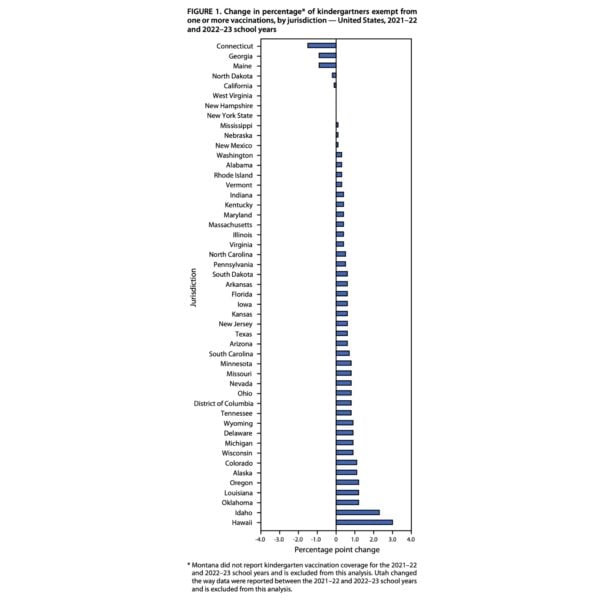Politics
CDC Reports Record High in Childhood Vaccine Refusals

The Centers for Disease Control and Prevention (CDC) has reported a startling trend: a record high in childhood vaccine refusals.
According to the CDC’s latest findings, 3% of children entering kindergarten during the 2022-2023 school year were granted vaccine exemptions by their states.
This figure, though seemingly small, is the highest ever recorded in the U.S. and represents a significant increase from previous years.
The trend is not isolated to a few states; 40 states witnessed a rise in exemptions, with ten states reporting exemption rates soaring over 5%: Alaska, Arizona, Hawaii, Idaho, Michigan, Nevada, North Dakota, Oregon, Utah, and Wisconsin.
Idaho stands out in this report, with over 12% of its kindergarten population having a vaccine exemption.

This statistic is more than a mere number; it is a reflection of a growing sentiment among parents and guardians across the nation. This surge is due to the distrust towards medical authorities and government mandates.
Summary from the report:
What is already known about this topic?
From the 2019–20 to the 2021–22 school year, national coverage with state-required vaccines among kindergartners declined from 95% to approximately 93%, ranging from 92.7% for diphtheria, tetanus, and acellular pertussis vaccine (DTaP) to 93.1% for polio.
What is added by this report?
During the 2022–23 school year, coverage remained near 93% for all reported vaccines, ranging from 92.7% for DTaP to 93.1% for measles, mumps, and rubella and polio. The exemption rate increased 0.4 percentage points to 3.0%. Exemptions increased in 41 states, exceeding 5% in 10 states.
What are the implications for public health practice?
Exemptions >5% limit the level of achievable vaccination coverage, which increases the risk for outbreaks of vaccine-preventable diseases. Vaccination before school entry or during provisional enrollment periods could reduce exemptions resulting from barriers to vaccination during the COVID-19 pandemic.
The number of kids whose caregivers are opting them out of routine vaccines has reached an all-time high, the CDC says, potentially leaving hundreds of thousands of children unprotected against preventable diseases like measles and whooping cough. https://t.co/49S7IprIf8
— NBC News (@NBCNews) November 9, 2023
Read the full article here


















